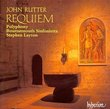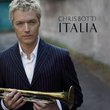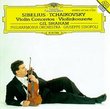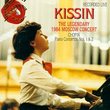| All Artists: Ludwig van Beethoven, Claudio Abbado, Berlin Philharmonic Orchestra, Belrin Radio Chorus, Sylvia Mcnair, Bryn Terfel, Bruno Ganz, Marie-Pierre Langlamet, Sascha Reckert Title: Beethoven: Incidental Music Members Wishing: 0 Total Copies: 1 Label: Polygram Records Release Date: 9/17/1996 Genre: Classical Styles: Historical Periods, Classical (c.1770-1830) Number of Discs: 1 SwapaCD Credits: 1 UPC: 028944774825 |
Search - Ludwig van Beethoven, Claudio Abbado, Berlin Philharmonic Orchestra :: Beethoven: Incidental Music
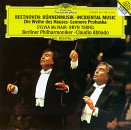 | Ludwig van Beethoven, Claudio Abbado, Berlin Philharmonic Orchestra Beethoven: Incidental Music Genre: Classical
![header=[] body=[This CD is available to be requested as disc only.]](/images/attributes/disc.png?v=a4e11020) ![header=[] body=[This CD is available to be requested with the disc and back insert.]](/images/attributes/disc_back.png?v=a4e11020) ![header=[] body=[This CD is available to be requested with the disc and front insert.]](/images/attributes/disc_front.png?v=a4e11020) ![header=[] body=[This CD is available to be requested with the disc, front and back inserts.]](/images/attributes/disc_front_back.png?v=a4e11020) |
Larger Image |
CD DetailsSimilarly Requested CDs
|
CD ReviewsNot Incidental! Walter Fekula | 10/22/1999 (5 out of 5 stars) "The title of "Incidental" music, while the actual title, is not at all descriptive of the music, which is just fabulous. If for no other reason, buy it for the "Overture to the Consecration of the House". Amazing! Now my favorite overture of any composer. Sound is great, Berlin Philharmonic is on top of their form." Extremely Rare Ludwig Van Erik North | San Gabriel, CA USA | 08/22/2006 (5 out of 5 stars) "Even with the greatest composers, not all of their music is as widely known to the public as some of their more prominent works. This is true of Beethoven, as can be seen here on this Deutsche Grammophon recording from the mid-1990s, involving two sets of incidental music scores that are hardly as well known as, say, either the Fifth, Seventh, or Ninth Symphonies of this composer. Take the music Beethoven wrote for "Consecration Of The House", in 1822, for instance. Essentially a restructuring of music he had written for an earlier play ("The Ruins Of Athens"), and rent with supernatural mythology, the work was comissioned for the rebuilt Josefstadt theater in Vienna for that year. Nowadays, it is known only for that impressive Handelian-influenced concert overture that bears its name. But the music, which takes up 51 minutes of the CD, is still quite impressive apart from the overture, containing fairly elaborate orchestration. The same holds true for the music for Johann Duncker's 1815 play "Leonore Prohaska" (which, despite its title and its themes of fighting for freedom that were part-in-parcel of Beethoven's being, had no relation to the composer's opera "Fidelio"). It is even less known than "Consecration", but it also features elaborate orchestration, including harp and the rarely used glass armonica, creating an almost supernatural effect. All of this is bought together under Claudio Abbado's direction, with two superstar vocalists (Sylvia McNair; Bryn Terfel), recitators (including Bruno Ganz), the Berlin Radio Chorus, and the Berlin Philharmonic. While neither score on this album is as well known as, say, Beethoven's own score for "Egmont", Mendelssohn's for "A Midsummer Night's Dream", or Schubert's for "Rosamunde", it is well worth looking for to hear a side of Beethoven that has almost never been able to see the light of day, either in recordings or in the concert hall." Occasional Music That Transcends the Occasion M. C. Passarella | Lawrenceville, GA | 05/23/2006 (5 out of 5 stars) "DG will probably reissue this fabulous recording someday, in some combination or permutation--maybe on Trio. But for now, try to get a hold of a copy if you can. The music from "Die Weihe des Hauses" may not be in the league of Mendelssohn's "Midsummer Night's Dream" music (or for that matter Beethoven's own "Egmont"), but it is in that class of honorable mentions among incidental music compilations. It certainly is as distinguished as, say, Schubert's "Rosamunde," Sibelius's "Tempest" and "Pelleas" (Faure's "Pelleas," too), or Mendelssohn's "Athalie"--all containing music that is in the repertoire or on the fringes of it. Beethoven's music is known for its oft-recorded "Turkish March" and for its stately overture in Handelian style. Poor old Handel never wrote an overture to equal it, of course, but like some of Handel's works, it starts with a slow introduction (this one replete with brassy fanfares) and leads to an extremely showy fugue, just the piece to celebrate the opening of a new (or in the actual case, a rebuilt) concert hall, which it did when Vienna's Theater in der Josefstadt was rededicated in 1822.
However, there is much more to this music, including a lovely initial "Invisible Chorus" that combines Classical poise with Romantic overtones (those horns and clarinets seem to take their cue from von Weber). Just as interesting is the "Chorus of Dervishes," with its exotic percussion and the strange, modal quality of its melody. Stump your friends with this piece (I have done so myself). It certainly doesn't sound like any other Beethoven, though it does speak to the lasting influence of Turkish music in old Vienna. But by the way, the Turkish pieces in "Die Weihe des Hauses" were actually lifted by Beethoven from his incidental music to "The Ruins of Athens," written for the opening of the Royal Theater in Pest, Hungary, in 1812. Despite the unusual use of a glass harmonica, the music from "Leonore Prohaska" is not half as important or memorable. But it constitutes only a tiny eleven and a half minutes out of the sixty-three on this excellently performed and recorded disc. When he's on form, Claudio Abbado is unbeatable in music of the Classical and Romantic eras, and here he is very much on form, as is the Berlin Philharmonic, which is apparently playing variably for its new music director, Simon Rattle. On the present disc, the Philharmonic sounds like Karajan's famous Beethoven machine of the 1960s. The chorus and soloists, too, accord Beethoven's gracious vocal music loving treatment, Bryn Terfel's voice both a magnificently powerful and clean instrument throughout, while Sylvia McNair turns in a typically lovely performance. Big, beefy recorded sound from DG with plenty of detail as well. This is a first-rate production all around." |

 Track Listings (15) - Disc #1
Track Listings (15) - Disc #1

